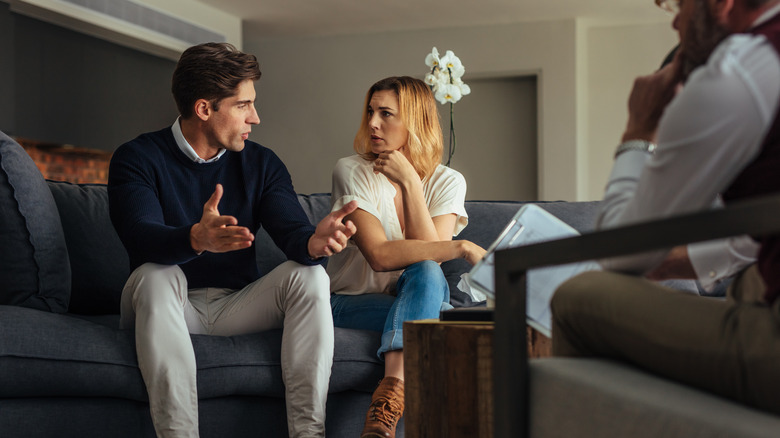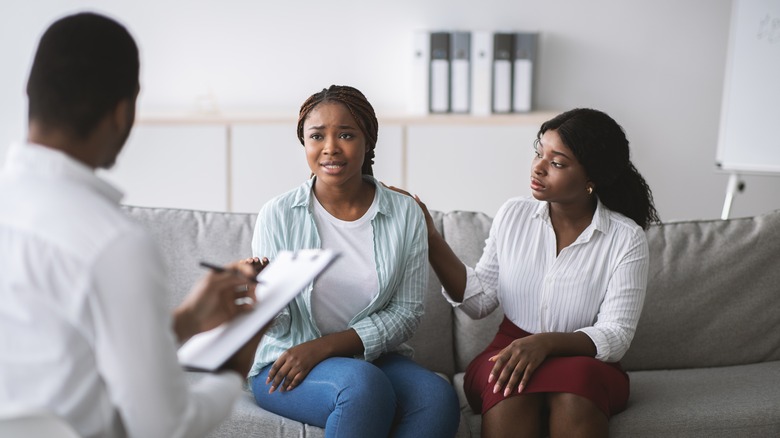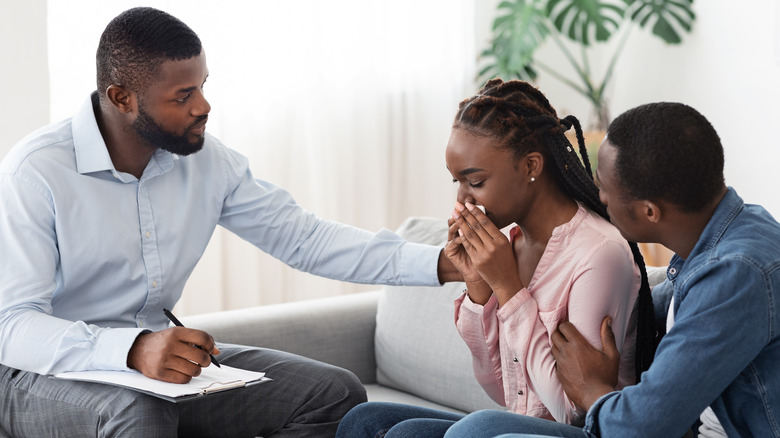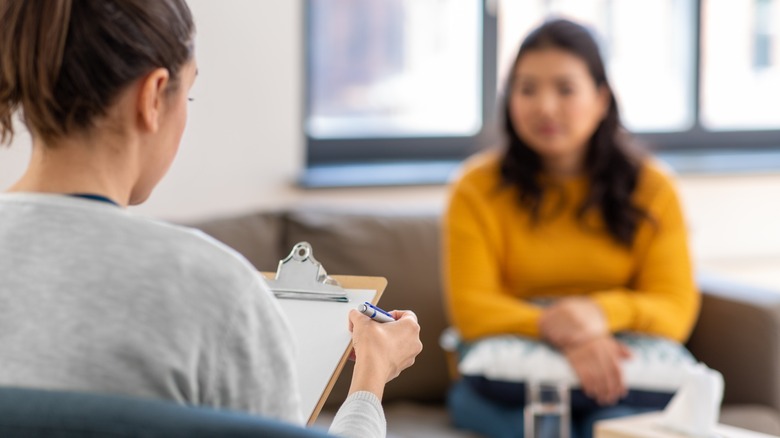Relationship Problems You May Not Have Known A Couples Counselor Can Help Fix
All relationships experience hardships and low points. While we would love for the honeymoon phase to last forever, it's only natural to become more comfortable with your partner over time and eventually run into the occasional conflict. While disagreements are natural, it's important not to ignore the signs that your relationship might be in trouble. If you find yourself constantly at odds, not communicating at all, or starting to feel resentment towards one another, it might be time to try couples counseling.
One study conducted by MidAmerica Nazarene University found that 49% of couples surveyed had participated in some form of couples therapy, and over half of those who had not attended said they would be open to it in the future (via The Knot). Even with those high statistics, lots of couples have a hard time admitting that they could benefit from a professional therapist's guidance. Many cultures and older generations of people view needing therapy as a weakness or an inability to handle problems on their own. While this could not be further from the truth, it often prevents people from seeking help when issues first arise, which can lead to deeper problems within a relationship.
Couples who attend therapy before conflicts arise have found massive success
According to renowned marriage and family therapist John Gottman, "Couples wait an average of six years of being unhappy before getting help." It can take a while to admit there is a problem between you and your partner, and even longer to actually sit down with a licensed professional. But according to relationship experts, the best time to attend couples therapy is actually before any real problems happen. Therapist Margaret Rutherford, Ph.D. calls this "prevention over intervention."
In an article published by The Gottman Institute, Dr. Rutherford explains that couples can develop "destructive pattern[s]" of behavior when conflicts arise without realizing it. If one partner has an anxious attachment style and the other one shuts down all verbal communication at the first sign of trouble, the couple may be subconsciously causing each other harm without intending to, simply because of their learned fight language. Seeking professional support before you feel you need it will help identify these deeply rooted habits, and you and your partner can develop a healthy fight language based on understanding before you do any severe damage. With the help of a couples counselor, you and your partner will develop tools for conflict resolution before any huge issues occur. This can actually prevent harmful events from occurring down the line, such as poor communication, loss of intimacy, and even infidelity.
Communication is the key to a healthy relationship
It sounds cliche, but it really is true: open and honest communication is essential to the foundation of a happy relationship. But not all forms of communication work for every couple. Psychotherapist Kimberly Resnick Anderson told CNN, "There are three sides to every story: his side, her side and the truth." A couples counselor can provide an environment for each partner to speak openly without judgment and guide their communication in a constructive way in order to find the truth amid conflict.
There are common relationship problems that many couples face but do not talk about. From money issues to trusting each other, being in a relationship is extremely vulnerable. There are plenty of reasons why couples subconsciously decide not to talk about a problem. It could be out of fear that bringing up a sensitive issue will start a fight, or they are afraid of the repercussions that might happen once these problems are acknowledged. When communicating during couples counseling, a therapist becomes a non-emotional, third-party perspective that can validate both partners' issues. They also provide tools and exercises that couples can practice at home when conflicts arise: TalkSpace shares that using positive language towards one another, "I" statements, and mindfulness exercises are all great ways to encourage connection and validation between couples during conflict.
Learn how your partner wants to give and receive love
One of the biggest issues that many couples face, especially after being together for a long period of time, is a lack of intimacy. Talking to another person about your problems in the bedroom might feel slightly uncomfortable at first, but a therapist's job is to remain professional, constructive, and judgment-free while they help you through even the most intimate of troubles. Being open to discussing sensitive topics may help you and your partner become more willing to hear each other's experiences, as well.
One of the best ways a therapist can assist with intimacy issues is by helping partners identify their differences in desire. Sex therapist Vanessa Marin spoke with Well + Good about spontaneous and responsive desire, saying, "If you're a spontaneous type, you feel the mental desire first, then the physical arousal second ... If you're a responsive type, you feel the physical arousal first, then the mental desire second." This kind of complexity is hard to identify without a therapist's guidance: If you and your partner experience different forms of desire, couples therapy will help you create a plan for more informed, intentional moments of intimacy. Your therapist can also help identify ways for you and your partner to connect without sex, based on how you both give and receive love.
Counseling can help navigate big changes together
When you and your partner have been together for a long time, there are going to be growing pains that you both experience. Big life events, career changes, grief and loss, and even past trauma can all directly affect a relationship dynamic without the couple even noticing. The strongest, healthiest couples are dedicated to growing together, and they know they can't do it all on their own.
Big changes can trigger unhealthy responses that have long been sedentary. Abandonment issues that your partner didn't know they had from childhood might creep in when your new job schedule leaves much less time for the two of you to connect. The loss of a family member may affect their willingness to be intimate or vulnerable while they navigate their grief. These issues happen under the surface and often cause problems for couples without their knowledge. Identifying the root of these behaviors and reactions is what a couples therapist does best.
When you decide to sit down with your partner and sift through trauma, a couples counselor acts as a guide to help you navigate safely through the emotions that may arise, and encourage both parties to stay open and honest about their feelings and perspectives. Nurturing a relationship through change can be extremely difficult, but with the help of a mental health professional, the couple is more likely to feel supported and hopeful during the process.
What to do when your partner doesn't want to to go therapy
Couples therapy can save not only your relationship, but also your mental and physical health. Yale School of Public Health researcher Cenjing Zhu found a link between "extreme marital stress" and heart attacks, with "severe marital stress" affecting "their quality of life and health" (via HealthDay). After learning about all the complex benefits that therapy can provide, it might seem like a clear answer for couples looking to reconnect and understand one another better. But not everyone is open to couples therapy, even if their partner is asking for them to attend.
For most couples, there is a world where your partner refuses to attend couples counseling with you. If this occurs, experts encourage the partner who wants to seek help to attend by themselves. This may seem counterproductive, but attending couples counseling by yourself can actually help provide you with clarity in your relationship in ways that you may not have received if your partner was present. It can also give you tools to de-escalate tense situations within the relationship, and help you decide if your partner can grow with you. Per Psychology Today, therapist Kristi Pikiewicz Ph.D. found that even when one person in a relationship attended couples therapy, their new knowledge and tools helped to create a different relationship dynamic that naturally encouraged the unwilling partner to adjust with them.





